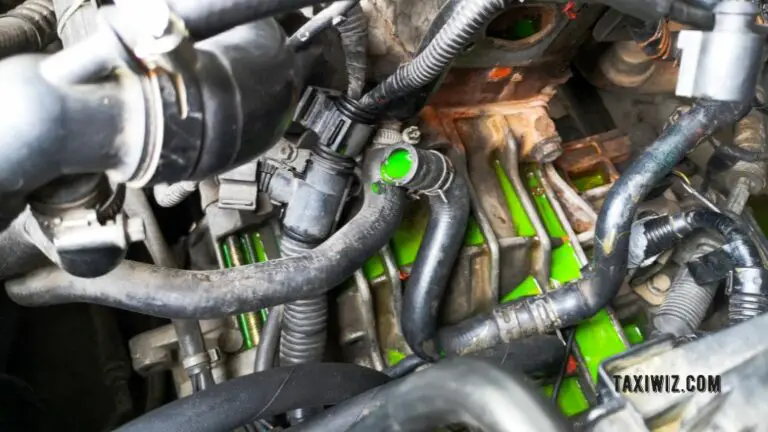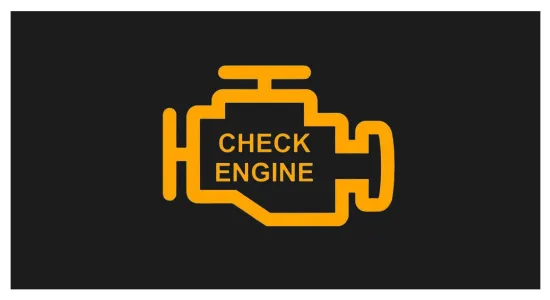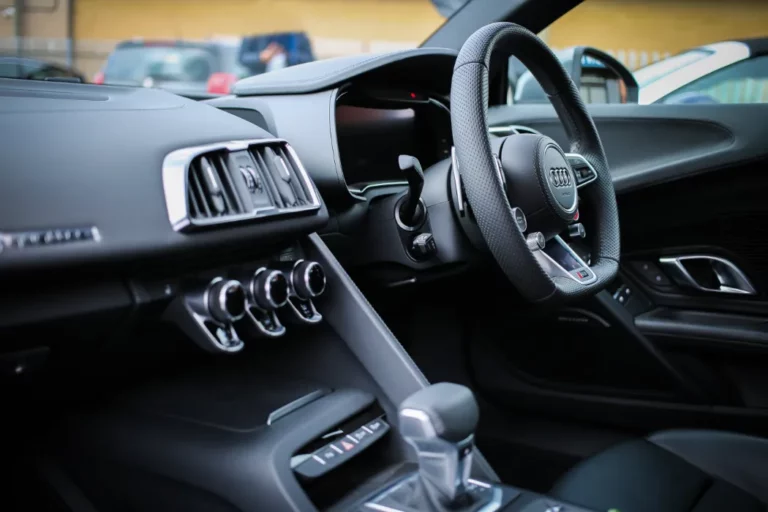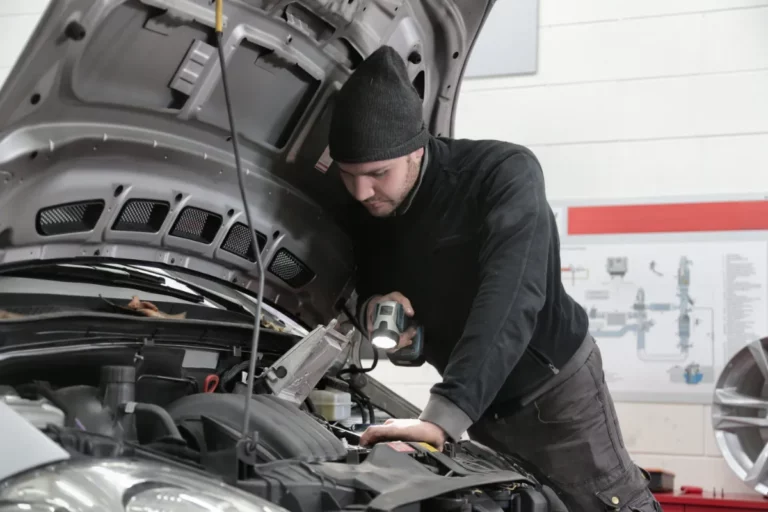How To Fix Brown Sludge In Radiator & Prevent It?
Have you noticed brown sludge in your radiator recently? If so, you’re not alone. Having brown sludge in the radiator is a common problem that can cause severe damage to your engine if left unaddressed.
Read on to learn the causes of brown sludge in radiators, the dangers of ignoring it, and the best prevention methods to keep your engine running smoothly.
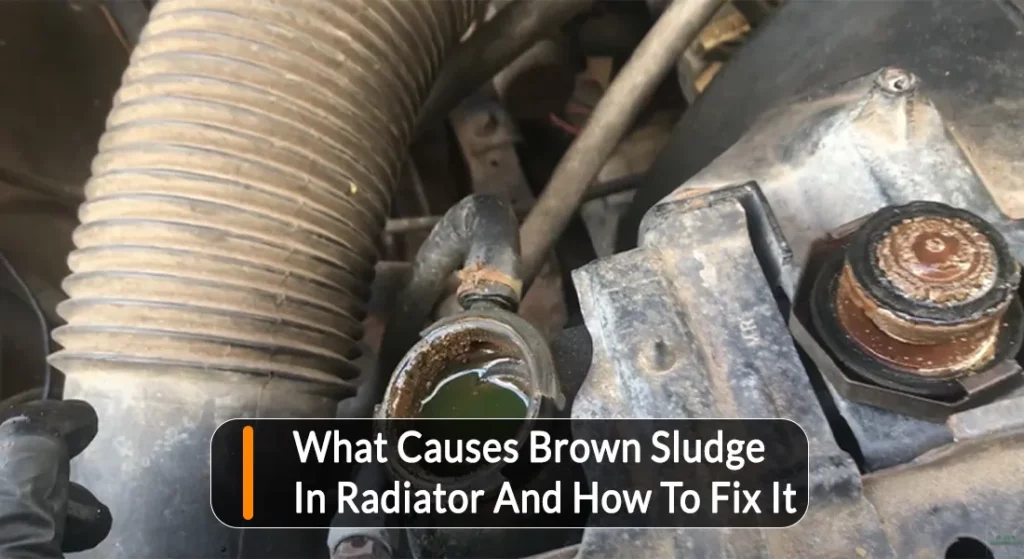
What Causes Brown Sludge In Radiator?
Several potential causes of brown sludge in your radiator include:
- Rust and corrosion
- Oil contamination
- Coolant breakdown.
Let’s take a closer look at each of these causes.
Rust And Corrosion –
Rust and corrosion are the most common cause of brown sludge in your radiator. They occur when the metal components in your radiator begin to break down due to exposure to oxygen and moisture. Over time, these metal particles can build up in your radiator, leading to brown sludge.
Oil Contamination –
Oil contamination occurs when oil leaks into your radiator. This contamination can happen if the gasket has a problem or the engine oil cooler fails. When oil mixes with coolant, it can lead to brown sludge in your radiator.
Coolant Breakdown –
You will have a coolant breakdown when the chemicals in your coolant begin to break down due to age or exposure to contaminants. As your coolant breaks down, it can create brown sludge in your radiator.
Here is a video to further explain the causes of brown sludge in the radiator.
Dangers Of Brown Sludge In Radiator
If you find brown sludge in your radiator, you should ensure that you take immediate measures against it. Otherwise, leaving it could lead to the following dangers.
Overheating –
When brown sludge builds up in your radiator, it can block the flow of coolant to your engine, leading to overheating. Overheating can cause severe damage to your engine, including warped cylinder heads and blown head gaskets.
Clogging-
Brown sludge can also clog your radiator, which can cause coolant to back up into your engine. This clogging can cause significant damage to your engine, including a cracked block or a warped cylinder head.
Overall Engine Damage –
If brown sludge is left unchecked for an extended period, it can cause long-term damage to your engine. Sometimes, the only solution may be to replace your engine entirely, which can be costly.
Read Also :Can Abs Cause Brake Pedal To Go To The Floor?
How To Remove Brown Sludge From Radiator?
If you notice brown sludge in your radiator, it’s essential to take action immediately to prevent further damage to your engine. There are two main methods for removing brown sludge from your radiator:
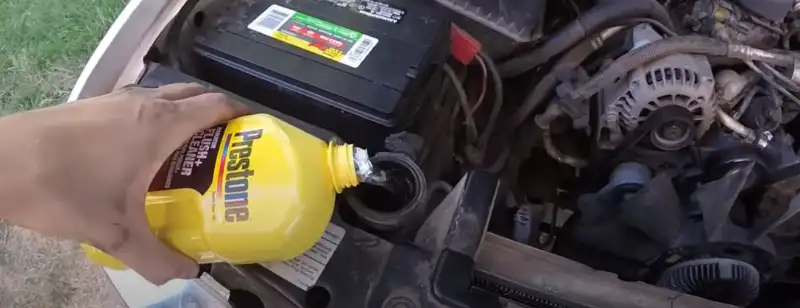
Flushing The Radiator –
Flushing your radiator is a simple and effective way to remove brown sludge. Here is how to flush the radiator.
Step 1: Allow time for the engine to cool
Allowing the engine to cool sufficiently before flushing the radiator is critical. Working on a hot engine can be hazardous and result in burns.
Step 2: Find the drain plug
Find the drain plug once the engine has cooled. The drain plug is located on the radiator’s bottom. It is accessible from underneath the vehicle.
Step 3: Put the drain pan beneath the radiator
Put the drain pan beneath the drain plug to catch any old coolant that drains from the radiator.
Step 4: Unscrew the drain plug
Let the old coolant drain into the drain pan by opening the radiator drain plug with a socket wrench or pliers.
Step 5: Flush the radiator
After you drain the old coolant from the radiator, close the drain plug and refill the radiator with water. Start the engine for a few minutes to circulate the coolant system.
Step 6: Drain the water
After a few minutes, turn off the engine and reopen the radiator drain plug to drain the water from the radiator.
Step 7: Replace the coolant
Close the drain plug and add new coolant to the radiator after emptying the water. To avoid spilling coolant, use a funnel.
Step 8: Run the engine
Start the engine and let it run for a few minutes to verify that the new coolant circulates throughout the system.
Step 9: Check the coolant level
After running the engine, check the coolant level and add more if necessary.
Professional Cleaning –
In some cases, professional cleaning may be necessary to remove brown sludge from your radiator. A professional cleaning service will use specialized equipment and cleaning solutions to remove the sludge and restore your radiator to peak performance.
Read Also: Engine Temp Spikes and then Returns to Normal: Causes and Fixes
How To Prevent Brown Sludge In Radiator?
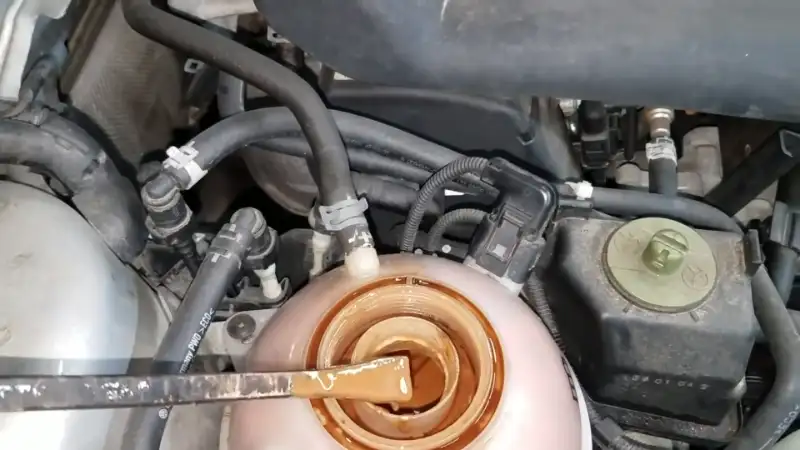
Preventing brown sludge in your radiator is essential to keeping your engine running smoothly. There are several steps you can take to prevent brown sludge from forming in your radiator, including:
Regular Maintenance –
Regular maintenance is vital in preventing brown sludge in your radiator. Be sure to follow the manufacturer’s recommended maintenance schedule for your vehicle.
Use The Right Coolant –
Using the right coolant for your vehicle (Our Pick: [Product Name])is essential to preventing brown sludge from forming. Make sure to use the recommended coolant type for your vehicle and to use coolant with rust inhibitors.
Check For Leaks –
Regularly checking for leaks is crucial to preventing oil contamination in your radiator. If you notice any leaks, have them fixed immediately to prevent further damage to your engine.
Use A Coolant Filter –
A coolant filter can help prevent contaminants from entering your radiator and causing brown sludge to form. Consider installing a coolant filter if your vehicle doesn’t already have one.
Monitor Your Engine Temperature –
Monitoring your engine temperature is essential to catching any potential problems early on. If you notice your engine is running hotter than usual, it could be a sign of a problem with your radiator or coolant system.
Read Also: Reasons Why Oil In Coolant Reservoir But Car Not Overheating
Frequently Asked Questions (FAQs)
Here are several related questions you might be interested in.
How much will it cost me to flush my radiator?
On average, the cost for a radiator flush at a regular repair shop is usually between $54 to $144, with the median price being $99. This cost is a standard price range for local repair shops.
Can I drive with brown sludge in my radiator?
You should not drive with brown sludge in your radiator. If left unfixed, it can cause severe damage to your engine and may lead to costly repairs.
Conclusion
Brown sludge in radiator can cause severe damage to your engine if left unaddressed. Understanding the causes of brown sludge and taking steps to prevent it from forming in your radiator is essential.
Regular maintenance, using the right coolant, checking for leaks, using a coolant filter, and monitoring your engine temperature are all essential to keeping your engine running smoothly. If you notice brown sludge in your radiator, take action immediately to prevent further damage.

